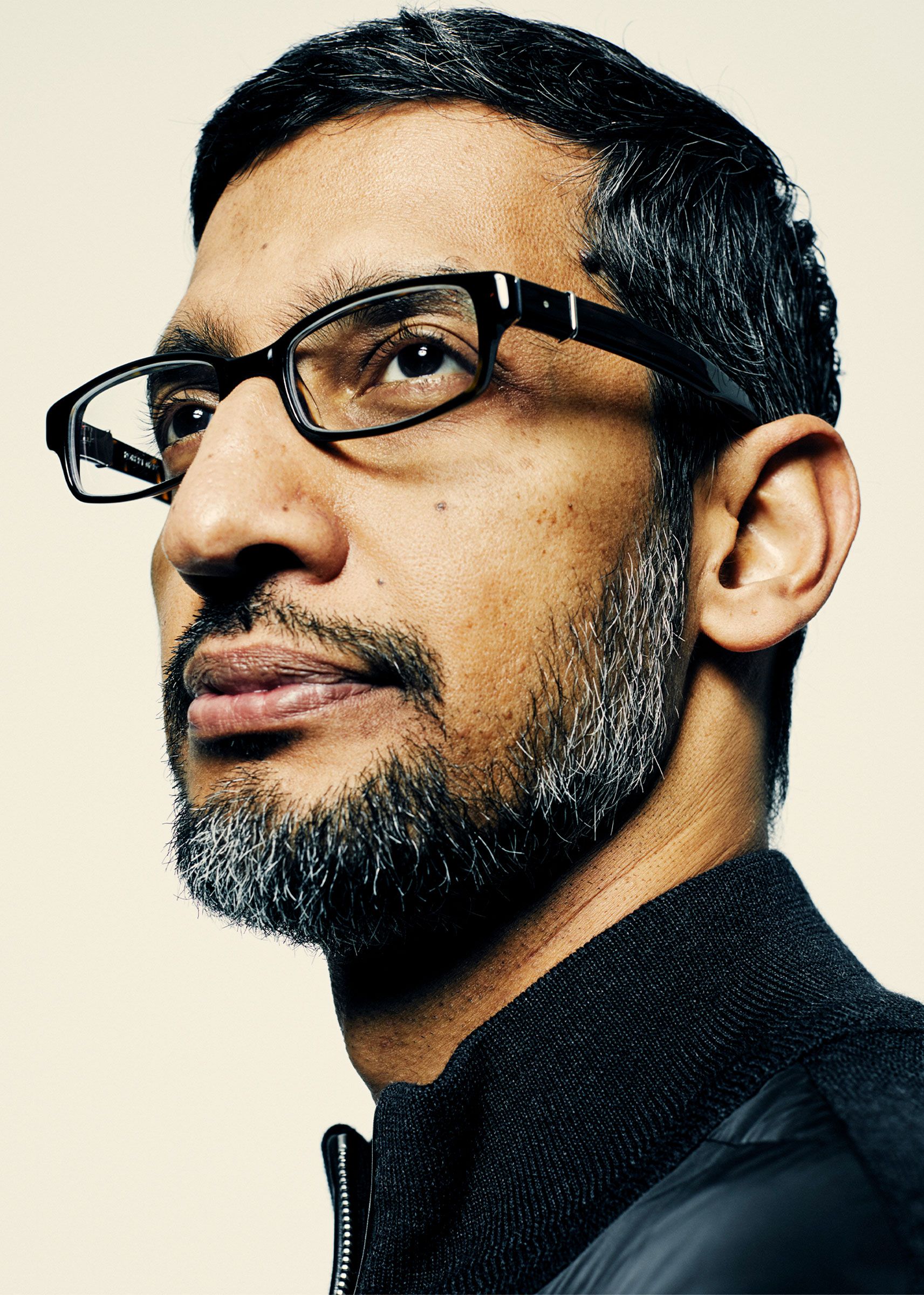In recent weeks, governments and citizens alike have turned to Alphabet, the parent company of Google and YouTube, for help with the COVID-19 pandemic. In a rare partnership with Apple, the company is working to turn smartphones into contact-tracing devices, on an opt-in basis, to help notify people if they’ve been exposed to the virus. More than 1,000 Google staffers have also volunteered to work on virus testing and screening programs run by Verily, Alphabet’s life sciences wing. Here, edited excerpts from TIME’s conversation with CEO Sundar Pichai about how he’s navigating this new landscape.
You’ve talked, as many innovators have, about crises being spurs to innovation. What does that look like right now? Google was founded right before the dotcom crash and built in a moment of severe, I would say, scarcity. That inspired us to solve problems with constraints. And be it distance learning, delivery—I think this moment will make people think creatively and think ahead.
It also seems as if there has been increasing collaboration between Alphabet and other tech companies, which might be competitors under different circumstances. Absolutely. When I talk to other leaders, there is a clear sense that this is something larger than all of us. We already have established protocols to work together—for example, around [combatting] child abuse. So we are relying on those pathways for coronavirus.
You recently announced a partnership with Apple to build contact-tracing software for people’s smartphones, which could notify them if they have recently encountered someone who tested positive for COVID-19. While that technology could stem future outbreaks, it also raises privacy concerns. How are you dealing with that? By putting privacy first. It’s up to the user to decide to consent. It’s transparent. They can choose whether to use it or not. And there’s no personally identifiable information or location data coming to Apple and Google as part of this.
We are now living through what the World Health Organization calls an “infodemic”—a deluge of misinformation, spreading mostly online, that competes with real news about COVID-19. How do you fight something like that? For me, supporting trustworthy institutions and sources has always been critical. In some ways, that’s easier right now because there is a shared sense of what is objectively right. And you can look to scientists, you can look to health authorities, and that helps you converge on facts.
At the same time, major platforms, including Google and YouTube, have had to rely more on AI to police content, especially as they figure out how to have human moderators work from home. Could that make it easier for bad information to get through? It’s a risk. But we are being more conservative too, in the sense that, early on, we prioritized information on Google and YouTube from what we call authoritative sources: health organizations, journalistic organizations and so on. We did not allow ads related to the coronavirus for a while, because we weren’t sure of our ability to moderate the content. But as we were able to get into a better work-from-home process, we’ve been turning the dials up—which is important, by the way. You want to give more people a voice.
This pandemic has hit local news organizations especially hard, which could potentially leave communities without access to reliable information. Are you thinking about ways Alphabet could help? We are working on some programs to support them with grants, as we have historically through our Google News initiative. But we need to figure out healthy sustainable journalism at the local level, and there’s more work to be done.
At one of his first coronavirus briefings, President Trump announced that Google was going to build a resource to help people find testing sites. Then reports emerged Google wasn’t fully aware of that plan. What happened? We were already working on providing more information about COVID, including about screening and testing. So we took that as an opportunity to engage closely.
Does it worry you that businesses are being asked to play roles that were once the purview of governments? I think technology and technology companies can play a significant role [in combatting COVID-19], and that’s the role we’re looking to play. But I wouldn’t get carried away with it. The roles are very clear. It’s up to governments and public-health organizations [to lead the response to this crisis].
According to a recent Gallup-Knight survey, 77% of Americans believe that tech companies like Alphabet have too much power. What do you make of that? I think large companies have seen a lot of growth over the past few years. So it’s a natural moment in time for that to be scrutinized. What it means to me is we, as a company, have to make sure we are doing good in society—whether it’s helping companies and schools stay connected or committing a $250 million ad grant to help organizations like the WHO disseminate important information on COVID-19. And I think that’s a test we will have to pass over and over again.
Much has been made, understandably, about the physical-health threat of COVID-19. Are you worried about a mental-health crisis as well, particularly among your employees? Absolutely. When I do an all-hands meeting or I get emails from employees, I can see that there are people who are dealing with isolation and loneliness. Or they’re affected because some of their family members have been really affected and they cannot be with them. I see that through my children at school. And while we say that the virus affects all of humanity, data shows it affects certain people disproportionately, such as the African-American community here in the U.S. So mental health is definitely going to be an issue coming out of this. And it’s something we all have to address more.
How do you think this crisis will change the way we work? Will more of us be remote? I think the reason we are able to work from home effectively is because we’ve done it face to face before. We built a foundation. And we need that foundation on a continual basis. I think it’s part of human nature. Having said that, can we do things more flexibly? Absolutely. When I look at the extent to which people commute and the toll it takes on their families and so on and so forth, I think we can come up with better solutions.
Not everyone has access to the same at-home technology and Internet service, which puts certain workers—and students—at a serious disadvantage. How do we bridge that gap? We have several projects under way, including a partnership with California Governor Gavin Newsom and T-Mobile to get wi-fi hot spots and Chromebooks to under-served communities and school districts here in California. And I think when the U.S. talks about infrastructure, there’s got to be a clear plan to provide both broadband and wireless connectivity to rural places and underserved communities.
What, if anything, gives you hope that some good might come out of all this? Collective action is the most powerful resource we have, and it’s actually working. Yes, there are issues, but there is more coordination than not. How do we prevent future pandemics? How do we solve climate change? How do we tackle AI safety? All of them will involve us coming together in some way or other. And that’s what gives me hope for the next generation.
Gibbs, a former writer and editor in chief at TIME, is the director of the Shorenstein Center and the visiting Edward R. Murrow professor at Harvard Kennedy School.
This article is part of a special series on how the coronavirus is changing our lives, with insights and advice from the TIME 100 community. Want more? Sign up for access to TIME 100 Talks, our virtual event series, featuring live conversations with influential newsmakers.
- Cybersecurity Experts Are Sounding the Alarm on DOGE
- Meet the 2025 Women of the Year
- The Harsh Truth About Disability Inclusion
- Why Do More Young Adults Have Cancer?
- Colman Domingo Leads With Radical Love
- How to Get Better at Doing Things Alone
- Michelle Zauner Stares Down the Darkness






